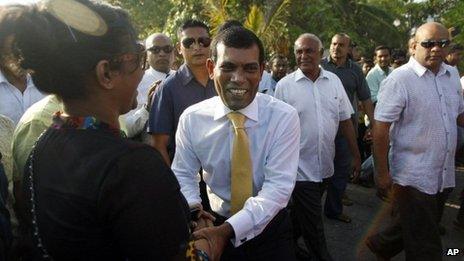Ex-Maldives president Nasheed leaves Indian mission
- Published

Mr Nasheed did not explain why he left, but expressed hope he would be able to continue his political activities
Former Maldives President Mohamed Nasheed has left the Indian High Commission in the capital, Male.
Mr Nasheed took refuge there 10 days ago after a court ordered his arrest for failing to appear to face charges of abuse of power.
He did not explain why he left the building, and a government spokesman warned the case against him was still pending.
Mr Nasheed was controversially forced from office a year ago.
Tensions remain between his own supporters and the government that replaced him.
Climbdown
When Mr Nasheed entered the mission on 13 February, his Maldivian Democratic Party said he would stay inside until a new caretaker government was formed.
But the situation was straining relations with the Maldives' giant neighbour, prompting Delhi to send a special envoy, says the BBC's correspondent Charles Haviland.
Mr Nasheed has now left the mission, saying he hopes to continue political activities and take part in a presidential election due in September.
In a notably conciliatory tone, our correspondent reports, Mr Nasheed told journalists that he believed compromise with the government was possible.
An official from his party admitted to the BBC that the former president could be arrested over charges that he illegally ordered the detention of a senior judge - the move which led to his overthrow.
Masood Imad, a spokesman for the current Maldivian president, said the previous arrest warrant against Mr Nasheed had expired and there was no new warrant in force "so far" - but the case against him was still pending.
Asked if he would be able to stand in the election, the spokesman said he believed the court would eventually fine Mr Nasheed or imprison him for a year and if the latter happened, he would be barred from standing.
Mr Nasheed, a pro-democracy campaigner, became the first democratically elected president of the Indian Ocean archipelago in 2008.
He claims he was forced to quit in February 2012 under duress after soldiers and police mutinied and overran the party's headquarters in Male.
But his successor, Mohamed Waheed Hassan Manik, who had been serving as his vice-president, insists Mr Nasheed left of his own accord after opposition-led protests.
- Published13 February 2013
- Published1 October 2012
- Published2 October 2012
- Published26 September 2012
- Published16 July 2012
- Published18 April 2012